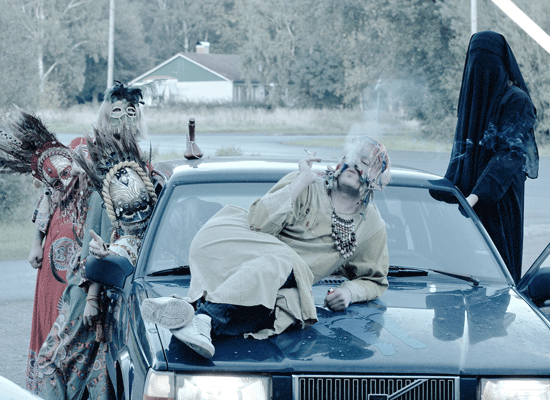
Swedish psych/folk/world-music collective GOAT gets down to basics on its third album
The members of GOAT, as you may or may not know, perform in elaborate masks and costumes, and use pseudonyms when speaking with the press, which they do only rarely. So when we are informed that the band member we’re about to be connected with has asked to go by “Goatface Killah” for the purposes of this interview, well, one wants to be accommodating.
Mr. Killah, whoever he may be, is actually quite forthcoming about Requiem, GOAT’s third album and a heady mix of energetic—what? World folk? Psychedelic jazz? Acoustic tripout soundtrack for a movie in your head? There’s a little of all of this on Requiem, a deeply melodic, groove-based record that dresses its compositions in roomy acoustic world-music instrumentation. Think Sun Ra’s mid- to late-1960s “outside” jazz, or Popol Vuh’s drone-y, dazy soundtracks for Werner Herzog, and you have the heart of it.
“We listen to a lot of music that feels very organic,” says Goatface, as we discuss the new album’s turn toward acoustic forms and tones. African and Asian rhythms and scales have always informed GOAT’s collaborative composition process. The band’s previous records, 2012’s World Music and 2014’s Commune (pronounced like the verb, not the noun, which we found out the hard way), fed those influences through the pedal-and-effects-box machinery of psychedelic rock. Requiem, though heavily overdubbed, was mostly performed live in the room on unprocessed instruments. The sound of that live space gives the album a kind of immediate, organic intimacy that’s new to the band’s music.
“I think in some ways this is the best album of the three,” says Goatface. “It’s not so hard, so fast. It has a more folkish vibe, more laid back. I think, too, it may be more interesting than the last two. It’s got a good, big sound. I like that it has the feeling of many double albums, in that it’s not so direct. You have to hear it for a while, then maybe lay it down for a couple of months or years and pick it up again, and you can hear something else in it.”
True enough. What strikes you first about Requiem is the sheer heft of the grooves and melodies on it. Strong, instantly memorable melodic lines are what you note on first listen, but with repeated plays, the intricacies of the improvisations on those lines become apparent.
“We try to keep the performances simple, in that we’re not controlling the process,” says Goatface. “Not everyone in the band has to be around for the first recording part. Could be two people, could be 10. Some people start the song, other people finish it.” (How many members are actually in GOAT? If you find out, write us c/o the masthead address.) “A lot of these songs never have a real ending. You record a groove, and add overdubs, and it feels OK. Beginnings and endings don’t really matter. It’s about getting that raw feeling into it.”
The construction of Requiem began a little more than a year ago, at which point the turn to acoustic forms wasn’t a part of the plan. There was no plan to be a part of at that time, which is the way GOAT prefers to work. “We never plan anything when we start out recording,” says Goatface. “Along the way it becomes what it is. We began to use more acoustic guitars and flutes, and ended up playing that way more than we’d done before. At some point, an album starts to take shape in your mind, and then you start putting the pieces together.”
For such an energetic record, the title seems a little incongruous. Goatface notes that Requiem was more metaphorical than descriptive: “The title for many reasons seemed to fit. The last album was darker. This one I feel is more ‘happy,’ creatively, somehow. With this album, we come full circle with something. We don’t know exactly what, yet. We’ll see.”
That intuitive approach infuses both the music and the spirit of the GOAT project. “The key thing that we try to do, always, is not think at all of what we’re doing, to try not to control the creativity in any way, or put up any obstacles or boundaries,” says Goatface. “All the music we listen to probably comes out in ours, but the simplicity of our music is something that’s key to what we do.”
—Eric Waggoner





